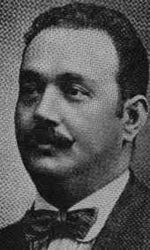Eduardo Georgetti
| Eduardo Georgetti | |
|---|---|
 |
|
| Member of the Puerto Rico Senate from the Barceloneta district |
|
|
In office 1917–1921 |
|
| President pro tempore of the Senate of Puerto Rico | |
|
In office 1917–1921 |
|
| Succeeded by | Juan Hernández López |
| Personal details | |
| Born |
October 11, 1866 Manatí, Puerto Rico |
| Died | 1937 (aged 70–71) San Juan, Puerto Rico |
| Spouse(s) | Aúrea Balseiro de Dávila |
| Occupation | Politician, Senator, Agriculturist, Businessman |
| Georgetti was the first Vice-president of the Puerto Rican Senate | |
Eduardo Georgetti (October 11, 1866 – 1937), was an agriculturist, businessman, philanthropist, and politician. Georgetti, who came from a family of prosperous land owners, became one of Puerto Rico's wealthiest sugar barons and benefactors. In 1917, he became the first Vice-president of the Puerto Rican Senate.
Georgetti (sometimes also spelled as "Giorgetti") was born in the town of Manatí. His father was Dr. Pedro Juan Giorgetti Battesti, an immigrant from Corsica and his mother Guadalupe Fernandez Vanga y Freites, native of Puerto Rico whose family were land owners. He became orphaned at a young age and went to live with his maternal uncle. He received his primary education in the Colegio de los Jesuitas de San Juan (School of the Jesuits of San Juan). Georgetti inherited the lands of his parents which his uncle administrated, during the time that he was in Corsica pursuing his secondary education at the Liceo de Córcega (Lyceum of Corsica).
Upon his return to Puerto Rico he found that the lands which he had left in the hands of his uncle had prospered enormously. Georgetti married Aúrea Balseiro Dávila in 1888. Together with is father-in-law, Rafael Balseiro, he purchased a company called Florida Agrícola and renamed it Sociedad Agrícola Industrial Balseiro y Georgetti (the Balseiro and Georgetti Industrial Agricultural Society). Georgetti founded and was the owner of the Plazuela Sugar Company, a sugar refinery, in the town of Barceloneta which had its own dock that was used to transport sugar by barge to the waiting ships on the ocean. The company, which was the core of his fortune, was the main source of income and employment of the towns' inhabitants.
Georgetti expanded his sugar industry empire by purchasing land and other sugar refineries. Among the sugar plantations which Georgetti purchased were Los Canos in Arecibo and the Central Plata, in which he served as the corporation's president. He was also the owner of the island's second largest pineapple plantation. Giorgetti was also a member of the board of directors of various banks, including the American Colonial Bank, Banco Comercial de Puerto Rico and Banco Nova Scotia.
It was common practice in Puerto Rico for businessmen to become involved in politics. On December 23, 1897, Georgetti was named Mayor of Barceloneta by Sabas Marin Gonzalez, the then-appointed Spanish governor of Puerto Rico. After the United States invaded Puerto Rico and the island became a U.S. territory as a result of the Treaty of Paris of 1898, which ended the Spanish–American War, the military-appointed governor, Major General John R. Brooke, permitted, upon the advice of Luis Muñoz Rivera, that Georgetti continue as mayor. Under the new administration, Barceloneta was merged with the town of Manati, as part of a joint municipality. Georgetti did not agree with this, and fought successfully for the re-establishment of Barceloneta as a separate, stand-alone municipality.
...
Wikipedia
